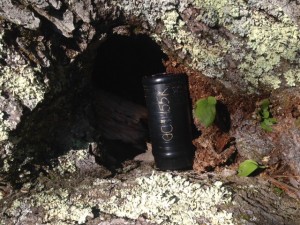A “Treasured” Walk in the Forest
Geocaching Gains Popularity
By Christina Vanderlip
Fourteen years ago, in May of 2000, a new outdoor recreational activity called geocaching germinated when the government announced that it would discontinue scrambling Global Positioning System (GPS) signals.GPS, a satellite navigation system, was initially developed by the United States Department of Defense for military use and thus the signals were deliberately scrambled for security purposes. Accuracy for civilian use was limited to about 100 meters. Now, civilians are instantly able to get accurate GPS readings to within 10 meters.
First played in Oregon, geocaching is essentially a treasure hunt using a handheld GPS-enabled device. Participants navigate to a specific set of GPS coordinates and then attempt to find the geocache (container) hidden at that location. There are only two necessities to play; a GPS device or a GPS-enabled mobile phone and a free membership at www.geocaching.com.
The idea is simple. Someone hides a container and notes the coordinates using a GPS. The coordinates are entered on a map at the geocaching website. The hunter then downloads those coordinates to their device and heads out to find the cache. A typical cache is a small waterproof container, often nothing more than a plastic leftover food container found in most kitchens. Some caches are easy to find, others are not.
There are a few who take delight in making caches as difficult to find as possible. Some of the more challenging hiding places include: birdhouses, fake bricks, hollowed out tree stumps and soda cans. Larger containers can also be used and may contain items for trading, usually toys or trinkets of little financial value, although sometimes they are sentimental.
The rules for the hunter are uncomplicated. They must sign the log book and may take or leave a trinket. If they take something, they must leave something. After signing the log, the cache must be placed back exactly where it was found. Upon returning home, findings are logged into www.geocaching.com (or not).
Geocaching is somewhat similar to the 160-year-old English game called letterboxing, which uses clues and references to landmarks embedded in stories It also shares many aspects with orienteering (also English in origin), which has been done in Norfolk for more than 30 years. However, unlike orienteering, geocaching is done in suburban and urban areas, too.
As with many new innovations, a unique vocabulary has evolved around the game. For example, a ‘muggle’ is any non-geocacher. Taken from the Harry Potter series (where muggles are non-magical people), this term is used when a non-geocacher accidentally finds a cache or looks puzzled when encountering a geocacher searching for a cache. Another term, “TNLN” means ‘Took Nothing. Left Nothing.’ and is usually written in cache logbooks by geocachers who do not trade for material contents in a cache. “TNLNSL” means ‘Took Nothing. Left Nothing. Signed Logbook.’ and “TNSL” stands for ‘Took Nothing. Signed Logbook’.
Geocaching wasn’t originally intended to be a competitive sport. It began simply as a personal challenge to find a hidden cache. However, there are those who do make it into a competition. The choice is yours – to become involved in a competition or just enjoy the fun of the game and the pleasure of being outside.
Should one be tempted to create their own geocache trail, they should keep in mind that there are strict guidelines, but there really is little need for that endeavor in Norfolk. There are approximately thirty geocaches in and around town as of this writing, as well as hundreds of thousands throughout the United States.
These days, technology-based games often create couch potatoes as they are played on a television, computer or phone screen. Geocaching is different in that while the planning is done on the sofa, the activity takes place outdoors. There is an old joke, “Golf is a nice walk, ruined.” Geocachers agree that geocaching is a nice walk made even better.
Photo by Christina Vanderlip.

